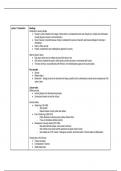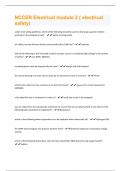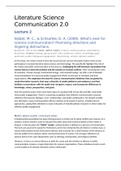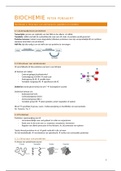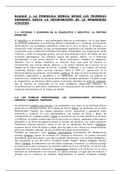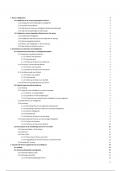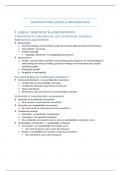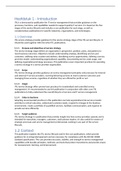Introduction to security studies
● Security= a state of freedom from danger or threat which is a fundamental human need. Security is a complex and multi-faceted
concept (physical, economic, environmental etc.)
● Study of security is important because it helps to understand the sources of insecurity and develop strategies for reducing or
eliminating it.
● History: military security
● Present: comprehensive and multidisciplinary approach to security
After the return to theory
● Early days: narrow focus on military security and the study of war
● 20th century: broadened its scope to wider security concerns (economic, environmental and human)
● The return to theory: close relationship with IR theory, more interdisciplinary approach to security studies.
Key concepts:
● Security
● Referent object
● Deterrence = strategy to prevent an adversary from taking a specific action by threatening to impose severe consequences if the
action is taken
Lecture notes:
Defining security
● Survival (freedom from life-determining threats)
● Survival-plus (freedom to have life choices)
Security studies
● Golden Age (150-1960)
- WWI & WWII
- National interest= security rather than welfare
● End of Golden Age (1960-1970)
- Public disinterest in national security (critique Vietnam War)
- Focus on international political economy
● Renaissance of security studies (1970-1990)
- New data (historical analysis, more access to archives)
- New methods (more social scientific approaches to explain historic events)
- New realities (en of CW, Iranian + Nicaraguan revolution, Societ intervention in African states and Afghanistan)
Changes due to the Cold war:
● Civilians as targets
● Criminalization of violence
● Identity-based wars
, ● Hybrid wars
Changes after 9/11:
● Global war on Terror (more international intervention)
● Conflicts more complex
Approaches:
● Traditional= focus on the state
- Realism= military security, deterrence
- Liberalism= institutions, intra-state war
- Constructivism= national interests, identities, culture
● Critical security studies= borders, migration, surveillance
● Feminism= gender in war and peace
● Post-colonial studies= development, economic security, regional security
Lecture 2: Anarchy, Readings:
Uncertainty & War Introduction to security studies
● Uncertainty= the extent to which the future is unpredictable or unclear
- The central feature of the security landscape, affecting the behavior of states and other actors in how the approach
security issues
● Sources of uncertainty:
- Distribution of power
- Emergence of new technology
- Actions of key actors
- Decision-making (risk-taking, caution, inaction)
● War= organized violence between political entities
● Outbreak of war:
- Changes in the distribution of power
- Economic factors
- Actions of key actors
- International institutions and diplomacy (preventing war & conflict)
Key concepts:
● Anarchy
● Uncertainty
● Security dilemma
● Strategy
● Great power
● Rising power
Lecture notes:
, ● Anarchy= lack of regulated interactions, absence of government over states
● Unresolvable uncertainty= created by material factors
● Uncertainty about the future
Superpowers= operate globally
Great powers= influential in multiple world regions
Regional powers= influential mostly within a single region
Non-powers= can have an effect on the power distribution (blind spot of the distribution of power theory)
Security dilemma=
● Core concept for understanding conflict escalation and arms races.
● Produced by anarchy and the resulting ‘self-help’ system in which security-seeking states exist.
● Driven by uncertainty and fear about the intentions others.
● Consequences are unintended and ‘tragic’ - but not inevitable.
How do we solve the security dilemma?
1) Define the other as a rival and therefore maximize one’s own (military) power
2) Create security regimes or an international society
3) Create a different world order
War:
1) Violent
2) Large-scale
3) Between organized political entities
Explanations of war:
● Rationalism= anarchy and uncertainty create two structural predicaments for states (information problems & credible commitment
problems) and this causes war
● Issue indivisibility is a possible but unlikely cause of war
China:
● Rising power: China might outshine the US (economic and military)
● Tensions between US and China
● Issue of Taiwan
● Western order is hard to overturn and easy to join (Ikenberry)
● Realist theory argues that the escalating tensions and risks of military confrontations are increasing due to this power transition and
could lead up to a great power war between China and the US
Lecture 3: Alliances, Readings:
Coercion and Diplomacy Introduction to security studies
● Alliances= a formal agreement between two or more states for mutual defense or cooperation
● Defense pacts, non-agression agreements, entente

